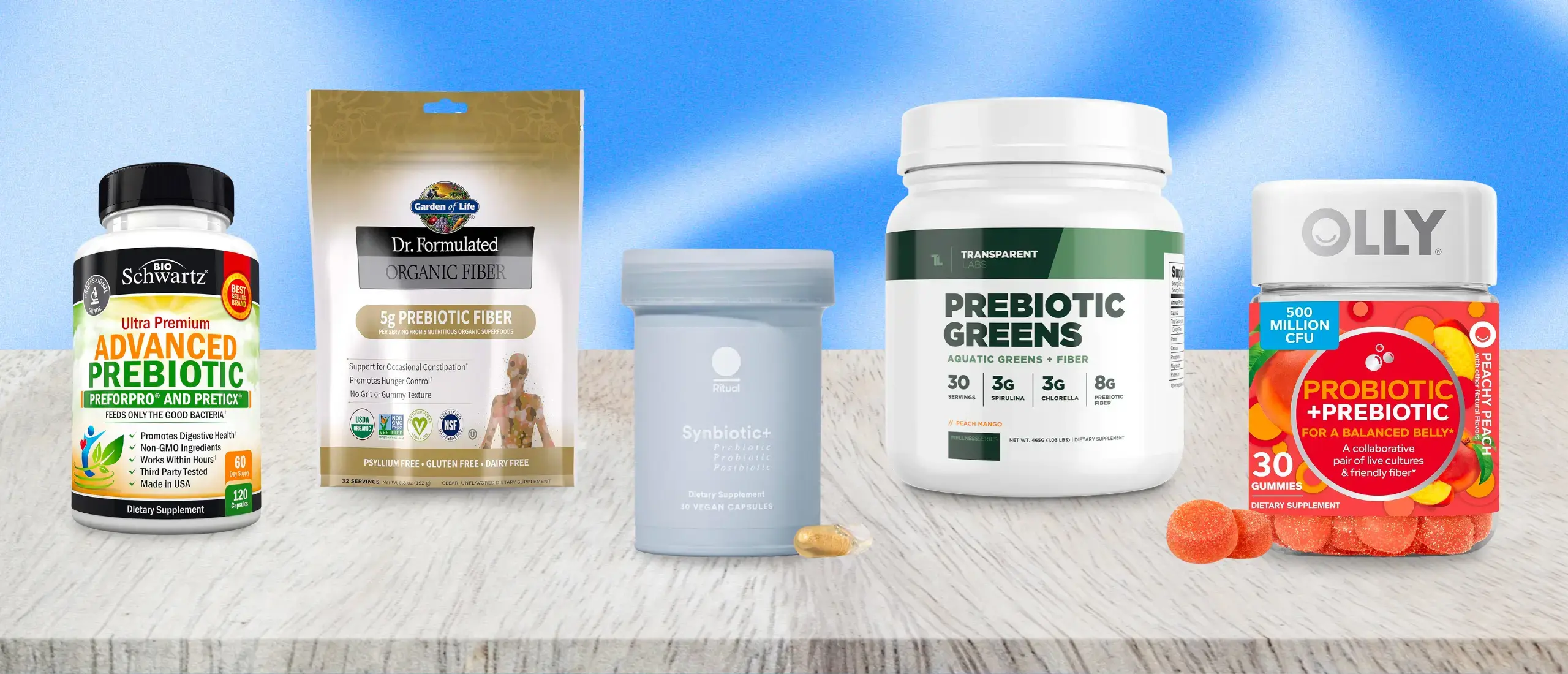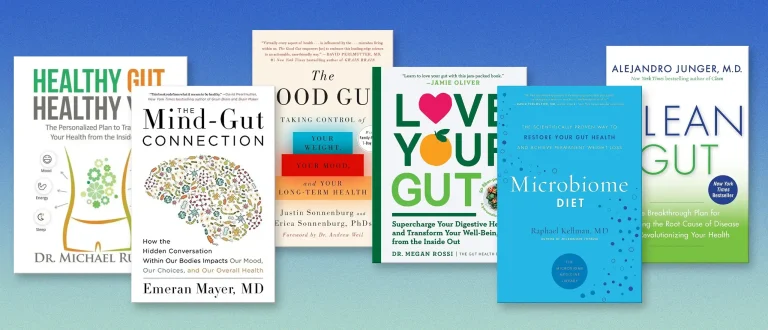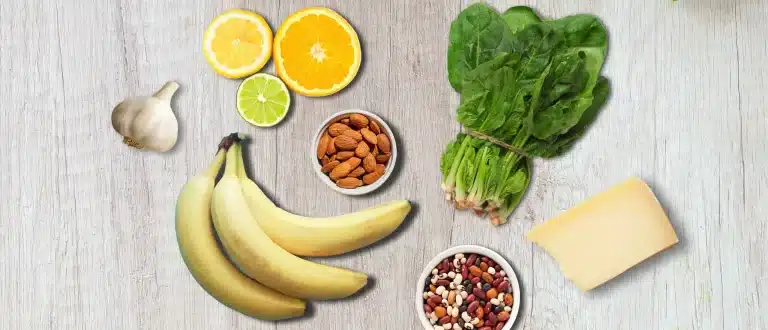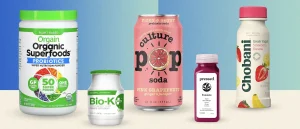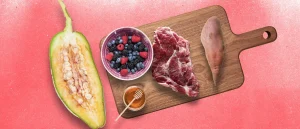5 Best Prebiotic Supplements for a Healthier Gut, According to a Registered Dietitian
- By Sydney Bueckert, NASM C.P.T., C.E.S., F.N.S., G.P.T.S.
- December 1, 2023
When it comes to taking care of your gut microbiome, probiotics get all the attention. But prebiotics that feed probiotics play an equally essential role in supporting and fostering a healthy, balanced gut. And prebiotic supplements are an easy way to get them.
Prebiotics come in food form, too. High-fiber foods like asparagus and bananas are great sources. The problem? If your microbiome is out of whack, your gut might not tolerate fiber very well which can lead to problems like gas, bloating, and discomfort, says registered dietitian Cesar Sauza, MS, RDN.
Here’s everything you need to know about prebiotic supplements, including whether you actually need a prebiotic supplement, and the best prebiotic supplements money can buy.
About the Expert:
Cesar Sauza, MS, RDN, is a registered dietitian nutritionist and clinical dietitian. Sauza has worked hands-on with patients experiencing IBS and SIBO, and has used prebiotics and dietary fiber as tools in the gut recovery process.
What Are Prebiotics?
In short, prebiotics are the nutrients that your good gut bacteria (aka probiotics) love to feed on. When you eat prebiotic-rich foods—like high-fiber veggies and legumes—beneficial gut bacteria break them down to create short-chain fatty acids which help reinforce gut wall integrity, and boosts the strength and population of healthy gut microbes (1).
What Are Prebiotic Supplements?
Prebiotic supplements are exactly what they sound like: Prebiotic compounds packed into pill, powder, or gummy form. The most common prebiotic fibers found in prebiotic supplements include: inulin, fructooligosaccharides (FOS), oligofructose (OF), and galactooligosaccharides (GOS). You might also see prebiotic fibers labeled as the fruits and veggies they come from like “Jerusalem artichoke fiber” or “chicory root fiber.”
“A prebiotic supplement may contain the same fiber found in fruits and vegetables but usually in a higher concentration (and sometimes a wider variety) than you might typically consume daily,” explains Sauza.
Do You Really Need a Prebiotic Supplement?
Maybe. We always suggest a food-forward approach to improve gut health, but prebiotic supplements might be helpful in some cases. Dietary fiber is good for your gut, but if your gut microbiome is in bad shape it can exacerbate symptoms like bloating and gas, functional medicine doctor Frank Lipman, M.D. previously told The Edge. According to Lipman, healing your gut before loading up on dietary fiber can help. That’s where a prebiotic supplement comes into play. “Prebiotic supplements may be an option for people with GI conditions like SIBO (small intestinal bacterial overgrowth, a condition that occurs when there is an abnormal increase of bacteria in the small intestine) and IBS, especially if they’re on a low-fiber diet,” says Sauza.
Do Prebiotic Supplements Work?
In a vacuum, yes. “Prebiotic supplements provide your body with fiber, which a thriving gut microbiome loves to feed on,” says Sauza. But a prebiotic won’t save you from a bad diet. “If your diet is high in sugar and ultra-processed foods—which negatively affect gut health—a prebiotic supplement may not make much of an impact,” he adds.
Research on prebiotic supplements is mixed. Prebiotics—in supplement and food form—have been associated with regulating gut inflammation, alleviating constipation, strengthening the immune system, and supporting overall gut health (2, 3, 4).
One recent study found prebiotic supplementation comparable to a low-FODMAP diet for relieving symptoms like gas and bloating in people with gastrointestinal disorders (5). Still, recent reviews have found little evidence that prebiotics, alone or combination with probiotics, help in managing irritable bowel syndrome (6, 7).
What to Look For in a Prebiotic Supplement
“Look for a prebiotic supplement with two or more types of prebiotic fiber,” says Sauza. For example, a prebiotic supplement that contains both chicory root and Jerusalem artichoke, is preferable to one or the other. “You’ll also want to avoid added sugars,” he adds.
Sauza also recommends looking for supplements that are informed choice, NSF, UL, or GMP certified—which signifies that a supplement has been third-party tested for quality and purity.
FUEL YOUR GUT
Best Prebiotic Supplements
Thinking about giving a prebiotic supplement a shot? With Sauza’s help, we’ve hand-selected the best options from comprehensive synbiotic—a supplement containing prebiotics, probiotics, and postbiotics—to prebiotic capsules, gummies, and powders.
References
1. Davani,-Davari, D. et al. (2019). Prebiotics: Definition, Types, Sources, Mechanisms, and Clinical Applications.
2. Naseer, M. et al. (2020). Therapeutic Effects of Prebiotics on Constipation: A Schematic Review.
3. Kalenhammer, T. et al. (2012). The Impact of Probiotics and Prebiotics on the Immune System.
4. Carlson, J. et al. (2018). Health Effects and Sources of Prebiotic Dietary Fiber.
5. Huaman, J. et al. (2018). Effects of Prebiotics vs a Low in FODMAPs in Patients With Functional Gut Disorders.
6. Ford, A. et al. (2018). Systematic Review With Meta-Analysis: The Efficacy of Prebiotics, Probiotics, Synbiotics, and Antibiotics in Irritable Bowel Syndrome.
7. Asha, M. et al. (2020). Efficacy and Safety of Probiotics, Prebiotics, and Synbiotics in the Treatment of Irritable Bowel Syndrome: A Systematic Review and Meta-Analysis.
8. Grubb, D. et al. (2020). PHAGE-2 Study: Supplemental Bacteriophages Extend Bifidobacterium animalis subsp. Lactis BL04 Benefit on Gut Health and Microbiota in Healthy Adults.
9. Salvin, J. et al. (2013). Fiber and Prebiotics: Mechanisms and Health Benefits.
10. Saha, M. et al. (2021). Pharmacological Benefits of Acacia Against Metabolic Diseases: Intestinal-Level Bioactivities and Favorable Modulation of Gut Microbiota.
11. Ahmad, I. et al. (2020). Studying the Influence of Apple Peel Polyphenol Extract Fortification on the Characteristics of Probiotic Yoghurt.
12. Majeed, M. et al. (2018). Cranberry Seed Fibre: A Promising Prebiotic Fibre and Its Fermentation by the Probiotic Bacillus coagulans MTCC 5856.
13. Garcia, K. et al. (2022). Impact of Dietary Sugars on Gut Microbiota and Metabolic Health.
14. Larson, R. et al. (2021). Acacia Gum Is Well Tolerated While Increasing Satiety and Lowering Peak Blood Glucose Response in Healthy Human Subjects.
15. Dibakoane, S. et al. (2022). Nutraceutical Properties of Unripe Banana Flour Resistant Starch: A Review.
16. Dibakoane, S. et al. (2022). Nutraceutical Properties of Unripe Banana Flour Resistant Starch: A Review.
17. Elaheh, M. et al. (2016). Prebiotic Effect of Jerusalem Artichoke (Helianthus tuberosus) Fructans on the Growth Performance of Bifidobacterium bifidum and Escherichia coli.
18. Andrade, L. et al. (2018). Chlorella and Spirulina Microalgae as Sources of Functional Foods, Nutraceuticals, and Food Supplements; an Overview.
19. Carr, A. et al. (2017). Vitamin C and Immune Function.
20. Medline Plus (2023). Bacillus Coagulans.



